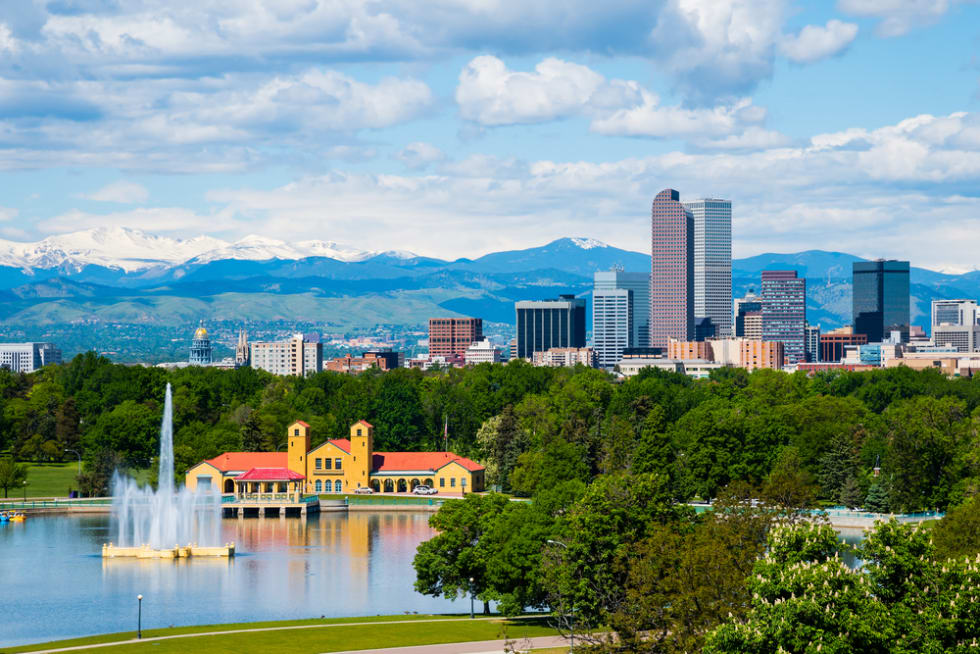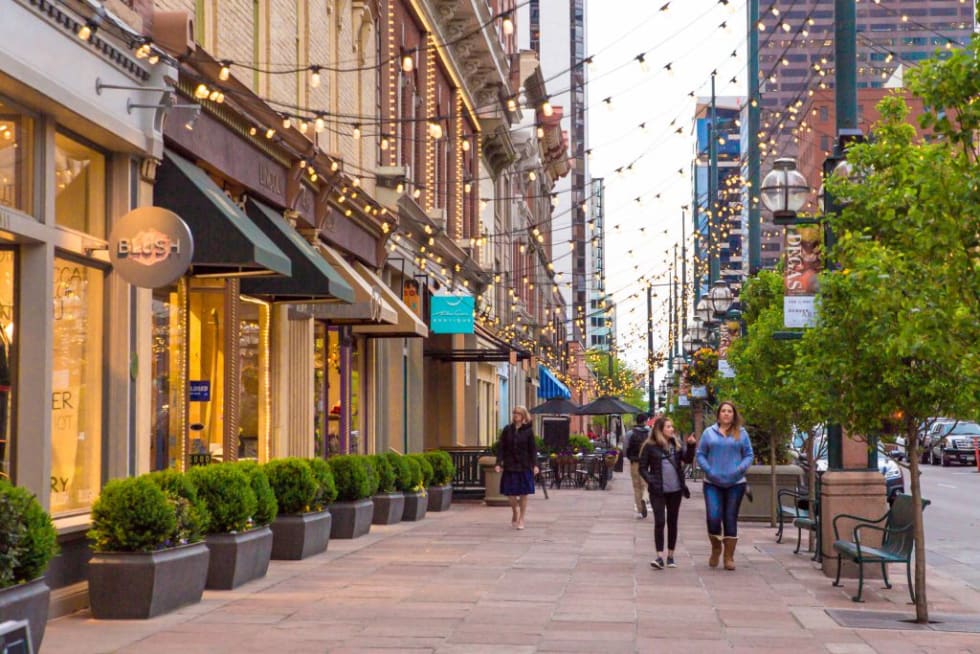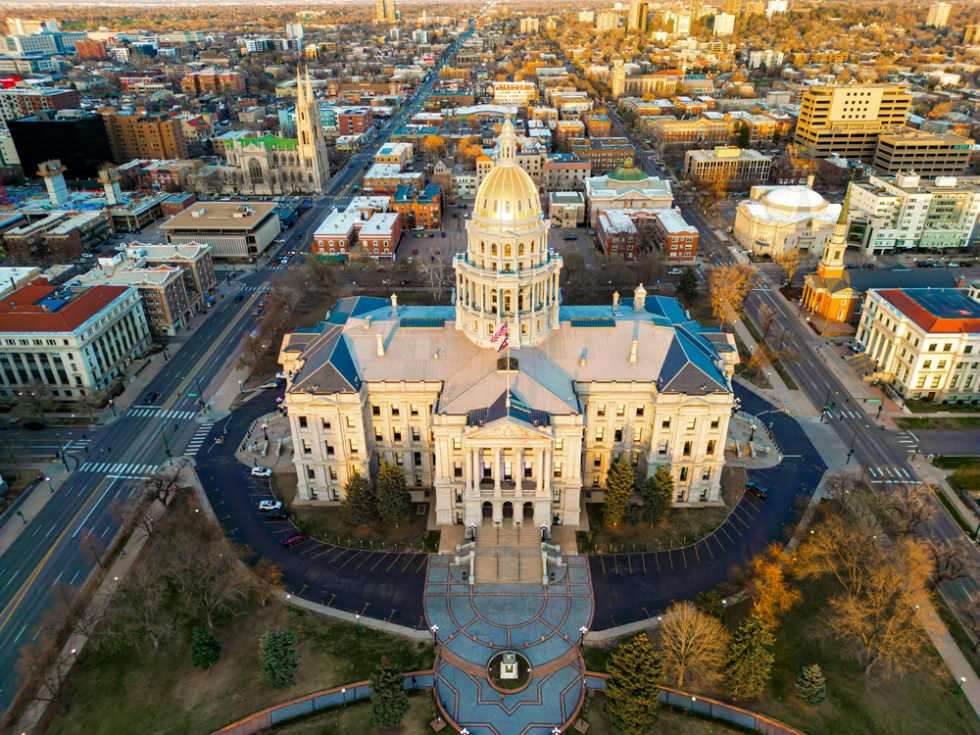- 71 units available
- Studio • 1 bed • 2 bed
- Amenities
In unit laundry, Wine room, Patio / balcony, Granite counters, Hardwood floors, Dishwasher + more

You can find cheap Denver neighborhoods in areas like Federal Heights, Indian Creek, Virginia Village, Washington Virginia Vale, East Colfax, and University Park, where rents run up to 32% below the city average.
The city’s rental market has cooled in 2025 after years of steep increases, giving renters more leverage than they’ve had in a decade. During the first quarter alone, roughly 20,000 new units were delivered, which added about 5% more supply and pushed vacancy rates to multiyear highs. That surge has eased price pressure and opened up opportunities in neighborhoods that once felt out of reach.
But this renter-friendly moment may not last forever. Analysts at MMG Real Estate expect the wave of new construction to taper off, with 2% to 3% annual rent growth likely returning by early 2026. For now, however, Denver renters can take advantage of higher vacancy, concessions, and overlooked neighborhoods that offer significant savings.
This Apartment List guide breaks down the cheapest neighborhoods in Denver, with our latest data, commute details, and cost of living highlights. You’ll also find renter hacks, budgeting tips, and FAQs to help you stretch your housing budget.

The overall average rent for Denver is $2,223 a month, but that number can be further broken down by unit type.
Our latest Apartment List rent report shows that the average rent for a one-bedroom apartment is $1,966, keeping the city above the national one-bedroom average of $1,778. Here’s a quick look at average rents by unit size in Denver for 2025:
Whether you’re looking for a compact studio near Downtown or extra space in a suburban-style apartment, Denver’s shifting market makes 2025 a strategic time to sign a lease.
Denver continues to attract new residents for its jobs, Colorado lifestyle, and outdoor amenities. That steady population growth puts pressure on housing demand. Even with thousands of new apartments delivered in 2025, the city isn’t building fast enough in its most desirable central neighborhoods. The result is that, long term, the apartments that do exist in those areas are snapped up quickly.
High mortgage rates are also keeping many renters from buying homes, extending their time in the rental market and adding to demand. Research from the Common Sense Institute reveals that the hours of work required to afford a mortgage in the Denver metro nearly doubled in the past decade, from 50 to 97 hours per month, indicating just how many renters are priced out of buying.
At the same time, Denver’s appeal as a lifestyle city continues to grow. The Mile High City consistently ranks highly among the top places to live for access to the outdoors, culture, and jobs, which means renters continue to compete for space.
Affordable neighborhoods in Denver aren’t just about lower prices; they offer real value for specific renter groups. Recent graduates looking for starter apartments, service industry workers wanting to stay close to jobs, remote professionals who prioritize space, and retirees seeking manageable costs all benefit from Denver’s cheaper areas.
The biggest wins? Lower monthly rent, more space, and a stronger community feel compared to pricier hot spots like LoDo or Capitol Hill. Many of these affordable Denver neighborhoods also offer manageable commutes, with access to Downtown in 45 minutes or less by Regional Transportation District (RTD) or car. That makes them ideal for renters who want to balance budget, comfort, and convenience.
Even with this cooling, Denver remains one of the priciest rental markets in Colorado. Statewide, average rents hover around $2,220, while Denver’s citywide average is slightly higher at $2,223.
According to Apartment List data, Boulder remains the most expensive market in the state at an overall average rental price of $2,608 per month, while cities like Colorado Springs offer more moderate prices at a city average of $1,727 per month.
The 2025 supply boom has given Denver renters a rare window of affordability. Compared to nearby suburbs where vacancy is stabilizing faster, Denver proper now offers opportunities to negotiate rent in ways that weren’t possible just a few years ago.
We didn’t just look at price when choosing Denver’s cheapest neighborhoods. To make sure affordability comes with livability, we applied extra filters that matter to renters.
These filters ensure that “cheap” doesn’t mean cutting corners on quality of life. Each neighborhood highlighted here offers a balance of price, safety, schools, and everyday convenience.
To qualify as cheap, a neighborhood needed to have an average one-bedroom rent at or below Denver’s citywide one-bedroom average of $1,966. We used Apartment List rent data and 12-month rolling averages to smooth out monthly swings.
But we didn’t stop at price. We also applied livability filters to make sure affordability doesn’t mean compromise:
This way, “cheap” neighborhoods also meet baseline standards for livability and convenience.

Here’s how the cheapest areas stack up against the citywide average rent of $1,966:
| Neighborhood | Average One-Bedroom Rent (2025) | % vs. City One-Bedroom Average |
|---|---|---|
| Federal Heights | $1,334 | 32.1% below |
| Washington Virginia Vale | $1,385 | 29.6% below |
| University Park | $1,392 | 29.2% below |
| East Colfax | $1,442 | 26.7% below |
| Virginia Village | $1,451 | 26.2% below |
| Indian Creek | $1,523 | 22.5% below |
Not every neighborhood fits neatly under our strict affordability cutoff, but a few areas come close and are worth keeping on your radar if you want affordability with additional lifestyle perks.
Capitol Hill
West Colfax

Finding a deal isn’t just about luck. On Apartment List, you can:
These tools help renters cut through Denver’s fast-moving rental market and secure deals quickly.
Keeping your finances healthy in Denver goes beyond the monthly rent. Try these strategies:
Denver’s rental market in 2025 finally favors renters. With thousands of new units boosting vacancy, landlords offering concessions, and neighborhoods like Federal Heights and Indian Creek offering savings of up to 32% below the city average, now is the time to secure a lease. While long-term growth is expected to return by 2026, today’s renters can take advantage of a rare affordability window in one of the fastest-growing cities in the United States.
Ready to find an apartment in Denver? Take the personalized Apartment List quiz. With us, you’ll spend five minutes and save 50 hours searching.
Federal Heights, where one-bedroom apartments average $1,334—about 32% below the citywide one-bedroom average of $1,966.
Oversupply is the top reason why rents are softening. About 20,000 new units came online in Denver in early 2025 and pushed vacancy to multiyear highs.
Yes, rents are expected to rise in Denver soon. Analysts expect modest 2% to 3% rent growth to return by early 2026 as supply slows.
Renters in Federal Heights or Indian Creek can save up to $600 per month on one-bedroom apartments compared to those in LoDo or Capitol Hill.
Yes, these Denver neighborhoods are safe relative to the city overall. All included neighborhoods have crime rates at or below Denver’s average.
It’s best to shop for a deal between November and February, when vacancies peak and landlords are more willing to offer concessions.
Yes, you can live car-free in these cheap Denver neighborhoods, though a car helps. Indian Creek and East Denver have reliable RTD routes, while West Denver and North Central are bike-friendly and close to the light rail.

In unit laundry, Wine room, Patio / balcony, Granite counters, Hardwood floors, Dishwasher + more
In unit laundry, Patio / balcony, Hardwood floors, Dishwasher, Pet friendly, New construction + more